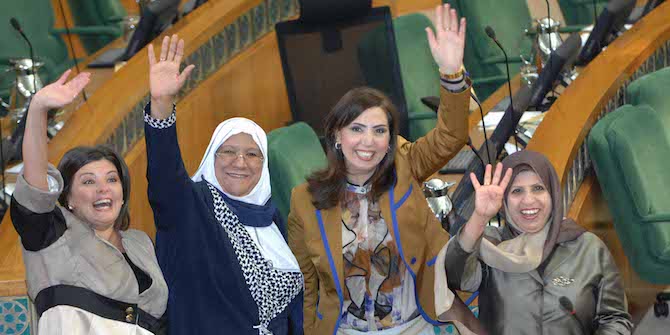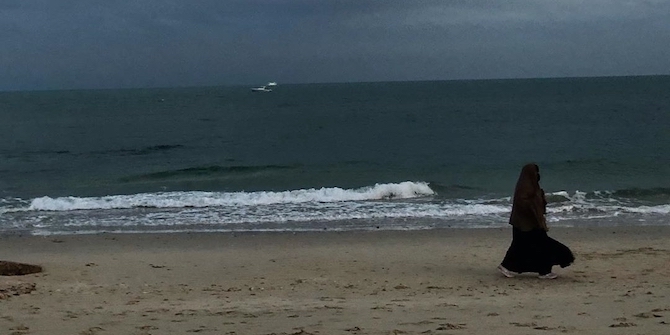by Dalal A. Marafie

A Diwaniya is a gathering commonly held in the Gulf region where people discuss politics, business, and other topics of interest. As traditional Diwaniyas only allow men, women have not been able to access the networks of their male counterparts. This disadvantage has largely excluded women from the decision-making process, which explains their lack of representation and visibility in Kuwait.
Diwaniyas play an important part in Kuwait’s political and social life, often serving as a platform for men to make decisions and influence policy. Men who attend these gatherings are usually well-connected and influential individuals: including politicians, business magnates, and tribal leaders.
In recent years, a movement has begun to establish Diwaniyas for women. Called ‘Ladies’ Diwaniyas’ or ‘Women’s Diwaniyas’, these gatherings are similar to their traditional male-only counterparts, but are exclusive to women. Women’s Diwaniyas gained prominence in the early 2000s, as women became increasingly comfortable with coming to these spaces and actively participating. Another movement promoted the concept of mixed Diwaniyas – where men and women can gather to discuss political and social issues – but are limited to parliament election campaigns. Although they are not as common as traditional male Diwaniyas, these gatherings are nevertheless gaining popularity and promoting the much-needed female agenda.
The handful of existing women’s Diwaniyas have been set up by prominent women in the Kuwaiti society, usually political activists and leaders of non-governmental organisation (NGO), who pursue gender equality. However, the concept of gender-inclusive Diwaniyas continues to be met with mixed reactions in Kuwaiti mainstream society. Some see it as a positive step towards greater gender equality and female empowerment, while others view it as a deviation from traditional Kuwaiti culture and society. Supporters of inclusive Diwaniyas argue that they provide a platform for women to voice their opinions, increasing visibility and representation. Participation in these gatherings not only allows women to connect with other influential women but also gives them greater access to political and social networks. On the other hand, some critics argue that Women’s Diwaniyas are unnecessary. They assert that women have their own separate spaces and that their participation in Diwaniyas could lead to a loss of traditional gender roles and societal norms. Despite the criticism, women inclusive Diwaniyas are gaining popularity and becoming established as part of Kuwaiti society, particularly during elections.
Studies show that gender equality and diversity have beneficial effects on organisations, institutions, and the overall economy. Breaking down the barriers between men and women promotes greater understanding and cooperation. By embracing gender diversity, organisations can harness the full potential of all individuals, leading to stronger, well-rounded, and more effective decision-making processes.
Women are under-represented in decision-making positions worldwide, and Kuwait is no exception. In addition, the country’s long-time political deadlock hinders the implementation of policies that would benefit women and provide more opportunities for them to achieve influence. However, gradual initiatives have succeeded in appointing women to governmental bodies, including several members of the Kuwait Credit Bank board of directors and the Deputy Governor of the Kuwait Central Bank, and naming a female ambassador to the United States of America.
Women’s and mixed Diwaniyas undoubtedly play a vital role in fostering inclusivity and promoting good dialogue, but they alone cannot lead to the realisation of absolute gender equality. While they serve as a step towards progress, they do not always address the systemic and structural barriers that hinder the accomplishment of true parity between genders. Ultimately, the presence of women is still not enough to match the influence of traditional Diwaniyas.
Therefore, decisions should only be taken within official spaces characterised by greater transparency and control. An official space is typically a versatile, multifunctional building where representatives, including independently elected officials, heads of governmental departments, and civil servants of all genders, interact. Reserving decision-making for such settings will assist in creating equal opportunities for women, challenging discriminatory practices, and advocating for diverse representation.
Continuing to allow male-only Diwaniyas to dominate decision-making fosters unfair power dynamics by limiting women’s influence in institutional spaces. It sends a message that women’s voices and perspectives are not valued or worthy of equal consideration. It reinforces traditional gender roles and stereotypes by suggesting that certain positions of power and influence are reserved for men and that women are less capable or deserving. It perpetuates a system that favours men’s interests and undermines efforts to create a more inclusive and equal society.
Women have an equal right to speak with authority on the decisions that affect their lives. Women’s Diwaniyas certainly go a long way toward creating an inclusive and supportive environment for women to thrive in various aspects of life, but they cannot by nature address all barriers to equal representation. To achieve true equality, decision-making must not take place behind closed doors.
[To read more on this and everything Middle East, the LSE Middle East Centre Library is now open for browsing and borrowing for LSE students and staff. For more information, please visit the MEC Library page.]






